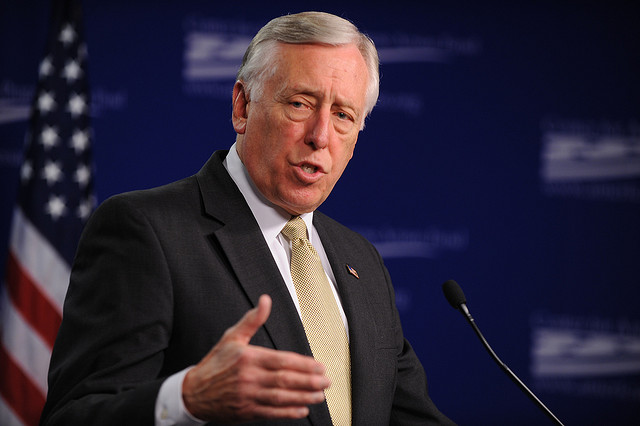by Jim Lobe
It’s possible — although still not probable — that my assessment earlier this week that the Geneva accord was out of the Congressional woods for this year may have been premature. It appears that Democratic Minority Whip Rep. Steny Hoyer, a long-time stalwart of the Israel lobby, is considering joining with his Republican counterpart, Eric Cantor, in co-sponsoring a measure — the exact details of which have not yet been disclosed — aimed at killing the deal before the Christmas recess. The Washington Post’s Greg Sargent described the state of play and the lobby’s and Cantor’s strategy in the House as of this afternoon.
It’s worth noting that Hoyer and Cantor have led delegations consisting of freshmen members of Congress to Israel virtually every summer for some years now. The trips are sponsored by the American Israel Education Foundation, the “educational” affiliate of the American Israel Public Affairs Committee (AIPAC), to ensure that the new lawmakers are thoroughly briefed on the Israeli government’s perspectives on a range of issues. (You may remember the one last year when one Kansas freshman under Cantor’s charge was inspired to go skinny-dipping in Lake Kinneret/Sea of Galilee. This is not the kind of publicity AIPAC normally seeks.)
It’s also worth noting that both Hoyer’s and Cantor’s campaign chests have benefited handsomely from AIPAC-associated political action committees over the years, according to the Center for Responsive Politics’ invaluable opensecrets.org website. For the last decade, they have both ranked among the top ten House recipients of “pro-Israel” largess — Cantor ordinarily within the top three or four, Hoyer a little further down (and he only ranked 12 in the 2003-04 cycle.) One Capitol Hill Middle East policy veteran who asked not to be named called Hoyer “the (Israel) lobby’s quarterback for the Democrats in the House,” a status presumably confirmed by his leadership of the annual AIPAC codels.
Hoyer must be deeply torn between his ties to the lobby and his position in the Democratic leadership, which appears to be dutifully lining up behind the administration and the Geneva deal, even if it hasn’t been particularly vocal about it as yet. As for Cantor, a true neo-conservative in his foreign-policy views, he is politically much closer to Netanyahu than to Obama, and it will be interesting to see what happens when, as planned, Bibi shows up in Washington Sunday for the annual policy conference of the Brookings Institution’s Saban Center (one day after Obama and Kerry are scheduled to address the conference). (Will Cantor persuade Boehner to invite Bibi to address the House in a special session for more standing ovations perhaps? Will the minority go along?)
Hoyer, of course, is not the only Democrat who is seen as vulnerable to the lobby’s pressure. Much has already been made of the seemingly uninformed complaints by Sens. Chuck Schumer (see this none-too-subtle neo-conservative attempt to keep Schumer in line in the Wall Street Journal today) and Robert Menendez about the deal. It’s notable that Menendez, who chairs the Senate Foreign Relations Committee, was the biggest beneficiary among senators of pro-Israel PACs in the 2011-12 cycle at about $340,000, and ranked eighth in his 2006 run, while Schumer ranked fourth in 2010 and ninth in 2004.
It’s Menendez who has teamed up with Republican Sen. Mark Kirk, who, as I noted last month, has received more campaign financing over the past decade from pro-Israel PACs than any other member of Congress, to lead the drive in the Senate to get new sanctions passed before the end of the year, even if they are prospective in application. Unsurprisingly, Menendez was the only chair of the four Senate committees that consider Iran within their jurisdiction who declined to sign a letter sent to Director of National Intelligence (DNI) James Clapper requesting that they receive periodic briefings on Iran’s compliance with the Geneva agreement. The letter, which was signed by Intelligence Committee Chair Dianne Feinstein, Armed Services Committee Chair Carl Levin, and Banking Committee Chair Tim Johnson, also requested a report by December 12 on the effects, if any, of Congressional action on new sanctions legislation during ongoing negotiations between Iran and the P5+1. It appears that Menendez is uninterested in how our intelligence community assesses Iran’s performance and intentions. That raises the question of whether, like Kirk, the chairman of the Foreign Relations Committee has more confidence in the information he gets from AIPAC or Netanyahu.
Meanwhile, former Secretary of State Hillary Clinton, who apparently has presidential ambitions, has maintained a Sphinx-like silence on the deal since it was signed. One wonders whether she can maintain that silence indefinitely, especially given the fact that it was she who was the first U.S. official to state that Washington could indeed abide, under limited circumstances, Iran’s enrichment of uranium as part of a peaceful nuclear program. Permitting any such an enrichment by Iran is precisely what Netanyahu, Cantor, Menendez, etc. wish to foreclose, which, Iran experts agree, would effectively kill the deal in its crib.
One final consideration for now: If the gambit of the hawks is to succeed — that is, getting new sanctions legislation or some other deal-killing measure out of the Senate this year — they will have only two weeks to do it. Mandela’s funeral, however, will take place Dec 15, and an invitation to attend — especially as part of a presidential delegation — will be irresistible, even to a Republican leadership which finds it convenient now to forget Ronald Reagan’s de facto support for apartheid. But the hours it will take to travel there and back will compress the time Congress has to conclude its business, thus reducing the likelihood that controversial legislation will be taken up.
Moreover, the experience of recalling Mandela’s life and example — notably his rejection of tribalism, revenge, the oppression of any group by another, and zero-sum gamesmanship — can have only a salutory effect on those who are invited and attend. Imagine the possibilities — not only for the U.S. politicos who go, but also for the heads of state, of which I imagine there will be plenty. Will Obama meet Rouhani? Will Peres, or even Netanyahu himself? It could be an interesting moment.
UPDATE: The event to which foreign leaders are being invited is not Mandela’s funeral on Dec 15, but rather the mass memorial on Dec 10. That will cut earlier and even more deeply into the Congressional calendar.
UPDATE: It appears that Netanyahu addressed the Saban conference via video-link from Israel and not in person. I had been told by the press contact at Brookings Friday that he was expected to attend.






I read elsewhere today, that the “O” will address the “other side” this weekend, doing a Bush Jr. act: “either you’re for the U.S. or Israel, but you can’t have it both ways”. This is perhaps the cold water that needs to be splashed upon those who would sabotage any sort of solution to the nuclear problem with Iran, in favor of making Netanyahoo feel good. After all, the Israelis are forever preaching that nobody can tell them what to do, yet they come hear to the U.S. demanding our government do what they say/want. If the Congress doesn’t want to back the P.O.T.U.S., then like the saying about not standing the heat in the kitchen, get out, the same holds true with the Iran deal.
Let us hope that the late Nelson Mandela will have an effect on the decisions of the US Congress not by the timing of his memorial, but by the example of his life. Mandela achieved through reconciliation and compromise with a wicked Apartheid regime what no amount of force or coercion could have achieved. Had he followed the logic of force and revenge, South Africa would have been torn by a terrible civil war in which both whites and blacks would have lost. However, he decided to change the old ways of doing things with a more positive attitude of inclusion, peace and cooperation. He was aware of the brutal past of his country but he refused to be imprisoned by it. He said: “Let us never be unmindful of the terrible past from which we come, not as a means to keep us shackled to the past in a negative manner, but rather as a joyous reminder of how far we have come and how much we have achieved.” The United States can achieve much more through diplomacy and negotiation, as President Obama is determined to do, than by being imprisoned by past grievances.
This article encapsulates what is wrong with our country today. Here we have a group of politicians who have been bought off by agents of a foreign power (i.e. Israel, or even Saudi Arabia in some instances) with campaign contributions, favors, or even blackmail. And if you or someone else stands up against them, they will smear you; I guarantee it. If you don’t believe me, ask Max Blumenthall or Stephen Walt. This is gut-check time for Obama’s national security team. Is there a James Baker or George Marshall on his team who is willing to stand up to the Israel Lobby and their Likud acolytes in the neocon establishment? Playing nice will not due, Mr. President. If Obama’s national security team is going to win, they will have to take on the Likud operatives, especially in the Republican Party, head on. That may mean vetoing bills, evasion on enforcement of sanctions, or whatever thwarts the actions of these people.
Financial Times report today suggests Israel will accept limited Iranian enrichment, to low levels. Perhaps 1000 to 2000 centrifuges. Convert Arak to be light-water reactor (rather than heavy-water).